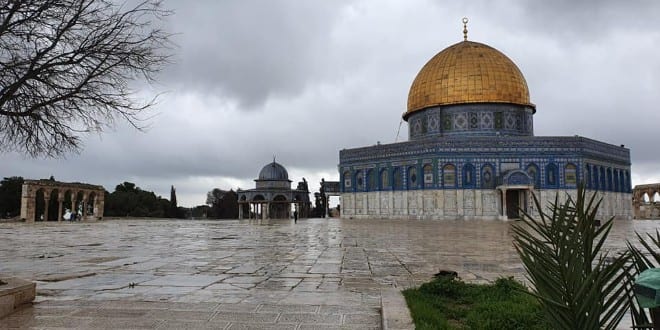Your cart is currently empty!

Secret Deal Results in Saudi Arabia Challenging Turkey for Control of Temple Mount
An article in the Hebrew-language Israel Hayom on Sunday reported on secret negotiations that have been held between Israel and Saudi Arabia since December that would result in including Saudi clerics in the Waqf council that oversees the Temple Mount in Jerusalem.
The Waqf has managed the Temple Mount since the Muslim conquest of Jerusalem in 1187, with the latest version instituted by the Hashemite Kingdom of Jordan after its conquest of the West Bank and East Jerusalem during the 1948 war. Accordingly, the King of Jordan currently supplies all of the funding needed to operate the waqf, which is in effect the civil administration for the holy site. The Grand Mufti of Jerusalem is in charge of Islamic religious affairs at the site. The Palestinian Authority has parallel organizations claiming an interest in these same matters which Israel does not officially recognize.
Israel Hayom cited top Saudi diplomats who remained anonymous as saying that senior diplomats and security officials from Israel, Saudi, and the United States were in dialogue concerning the implementation of President Trump’s Middle East Peace Plan. According to the report, Jordan objected to the proposal but in the wake of recent Turkish interference in East Jerusalem and the Temple Mount, the Jordanian government now supports having Saudi clerics as part of the Waqf council.
This seems to be a total reversal of the Jordanian Temple Mount policy. In February 2019, the Jordanian government, which controls the Waqf, enlarged its council from 11 to 18 members last week including Palestinian clerics or the first time. At the time, the move triggered a wave of Muslim violence on the Temple Mount. It was reported at the time that the move was an attempt by the Hashemite Kingdom that rules Jordan to ally with the Palestinian Authority in an attempt to prevent the Saudis from replacing them as custodians of the Jerusalem holy sites considered important to Islam. Rather than create an alliance, the restructuring of the Waqf council to include Palestinian clerics led to greater conflict as the PA tried to put Abbas loyalists in place, a move the Hashemite rulers of Jordan strongly opposed. The PA loyalists were also closely allied with Turkey and President Recep Tayyip Erdoğan who funded their organizations to the tune of tens of millions of dollars.
As Turkey’s influence over the Palestinian Waqf members increased, the Hashemite Kingdom let it be known to Israel and the US that they would be open to including Saudi Arabia in the custodianship of the Temple Mount as long as it is not to the detriment of their special status as custodians of the Jerusalem holy sites. The Jordanian government also required that the Saudi government will provide several million dollars to Islamic institutions in east Jerusalem and the Temple Mount as a means of putting diplomatic pressure to remove the Turkish influence operating under the protection of the PA.
Dr. Mordechai Kedar , a senior lecturer in the Department of Arabic at Bar-Ilan University, explained the complex background and interests.
“You have to understand that the Sunni world today is sharply divided between pro-state organizations and movements which are by definition a rebellious, anti-establishment form of Islam,” Dr. Kedar explained to Breaking Israel News. “The pro-state Muslims are headed and funded by Saudi Arabia and the anti-establishment Muslims, which include the Muslim Brotherhood, Hamas, and Hezbollah, are headed ideologically by Erdogan and sponsored by Qatar. This is a giant struggle between two kinds of Islam: revolutionary Islam and state Islam.”
Unfortunately, Turkey is now a factor in internal Israeli politics.
“Turkey infiltrated Jerusalem in a very big way, pouring millions of dollars into recruiting Palestinians and setting up his form of Muslim institutions,” Dr. Kedar said. “This includes close ties between Erdogan and the Northern Branch of the Islamic Movement which was banned by the Israeli government in November 2015 due to close ties with Hamas and the Muslim Brotherhood.”
“The Palestinian Authority is, unfortunately, allying with Turkey for the money since they don’t want to lose power and relinquish power to Hamas,” Dr. Kedar noted. “Jordan is willing to ally with Saudi Arabia because of its economic difficulties.”
“Israel wants to ally with Saudi Arabia because it is a pro-establishment form of Islam. You can talk with them. They are reasonable. It does not go against the interests of Israel. Since Israel and Saudi Arabia have shared interests, it is preferable that they have a say in the custodianship of the Temple Mount and a stronger influence on the Palestinians.”
“It is important to have the status connected with holy sites but when faced with the existential threat posed by Turkey, Jordan will choose to ally with Saudi Arabia.”
Source: Israel in the News
